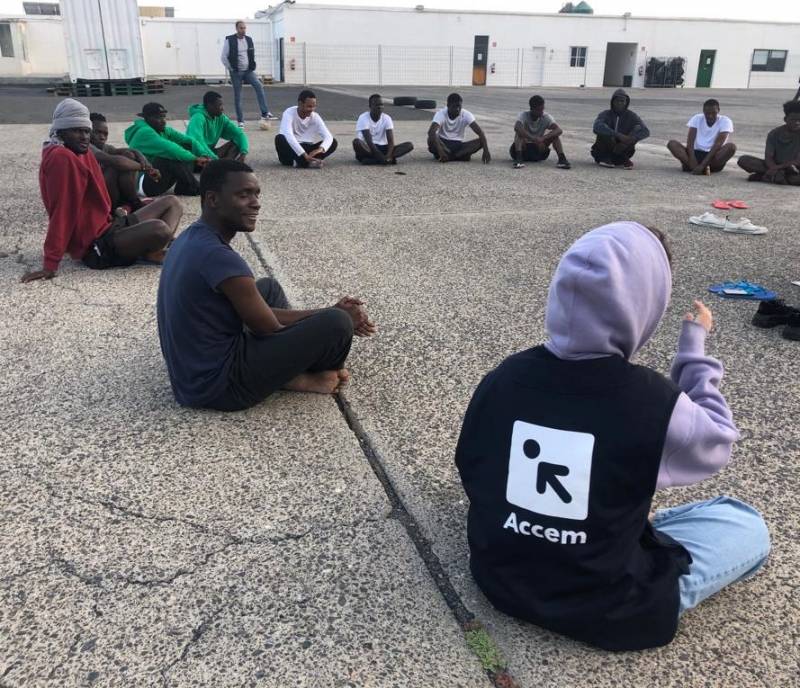article_detail
Date Published: 26/10/2023
Spain transfers hundreds of African migrants amid wave of small boat arrivals
Undocumented migrants and refugees crossing into the Canary Islands have shot up this month, prompting the Spanish government to move masses to the mainland

In response to the unprecedented numbers of illegal migrants making their way from Africa to the Canary Islands this month, the Spanish government has accelerated the transfer of hundreds of people to the mainland to decongest the migration and reception centres on the islands.
So far in the month of October, more than 13,000 people have arrived in the Canary Islands after having crossed the border illegally in rickety boats known as ‘cayucos’.
As a result, the government is working with its humanitarian care network to move these migrants, according to their level of vulnerability, to available spaces in migrant intake centres nationwide.
The lesser-known Canary Island of El Hierro has been particularly affected by illegal migration this year. On an island of 11,000 inhabitants, more than 8,600 migrants have arrived so far in 2023, according to the counts provided each day by emergency services.
Those being transferred are all undocumented adults. Minors who arrive alone are the responsibility of the autonomous community and not the central government; the Canarian Government currently protects around 4,400 migrant children, according to the latest data provided this Wednesday by the Minister of Social Welfare, Equality, Youth, Children and Families, Candelaria Delgado.
Several hundred such migrants have been taken to Spain’s capital Madrid by way of the Andalusian city of Almería, where provincial coordinator of the Red Cross, Francisco Vicente, explained that throughout this week they hope to be able to conduct individual interviews with all those transferred to find out their situation “to support them and put them in contact with their support network and family members they have in Spain”.
Other migrants are housed in government centres, charity homes and other buildings set aside especially for this purpose. Migrants are not obliged to remain in the centres they are assigned to and may move freely throughout the national territory. Many decide to use their own family support networks and sometimes their final destination is another European country.
In Málaga, 240 migrants transferred to the municipality of Torrox have been housed in the Urban Beach hotel, which is currently closed to the public after the end of the summer season, while 150 transferred to Medina del Campo (Valladolid) have been given accommodation in the spa of the Palacio de las Salinas, which is closed for renovations.
Spain’s Ministry of Inclusion, Social Security and Migration points out that in many cases these are specific, targeted and very short stays, while the final destination of these people is decided. If they do not meet the conditions to be returned to their countries, they can register in the care network and the Ministry determines their distribution and pays for their reception in centres.
They say they are looking for locations, both public and private, throughout the peninsula to guarantee a dignified reception for immigrants.
However, some towns and cities around Spain have complained of not being given enough advance warning from the government that they would be forced to take in additional refugees, especially those on the coast who already have to contend with large numbers of migrants crossing into Europe via the Mediterranean route.
In Cartagena (Murcia), where there is already a Temporary Care Centre for Foreigners (CATE), the Mayor has opposed the installation of a new centre after it became public that in recent weeks Ministry workers have visited Defence facilities in the area, including the old Naval Hospital, in search of more spaces to house migrants. The city has taken in 100 migrants who were rescued from the sea last week, who were welcomed by NGO Accem, which fights for the rights of migrants and works towards their inclusion in Spanish society.
The Valencian Community, meanwhile, will welcome at least 350 migrants who arrived by boat to the Canary Islands. Government delegate to the region, Pilar Bernabé, said, “It is time to stop the hate speeches that have nothing to do with sensitivity and the spirit of Valencians.”
In Alicante alone, a total of 145 people have arrived aboard several small boats to the Costa Blanca in the first two weeks of October, according to numbers supplied by the Red Cross.
On the issue of forewarning for those being asked to take in migrants, Bernabé said, “Each of the municipalities will be notified of how the arrivals of migrants are being carried out”, adding that these are “people who are weary, exhausted and drained, and who need rest” from their “ordeal”.
Image: Accem
Contact Spanish News Today: Editorial 966 260 896 /
Office 968 018 268



























